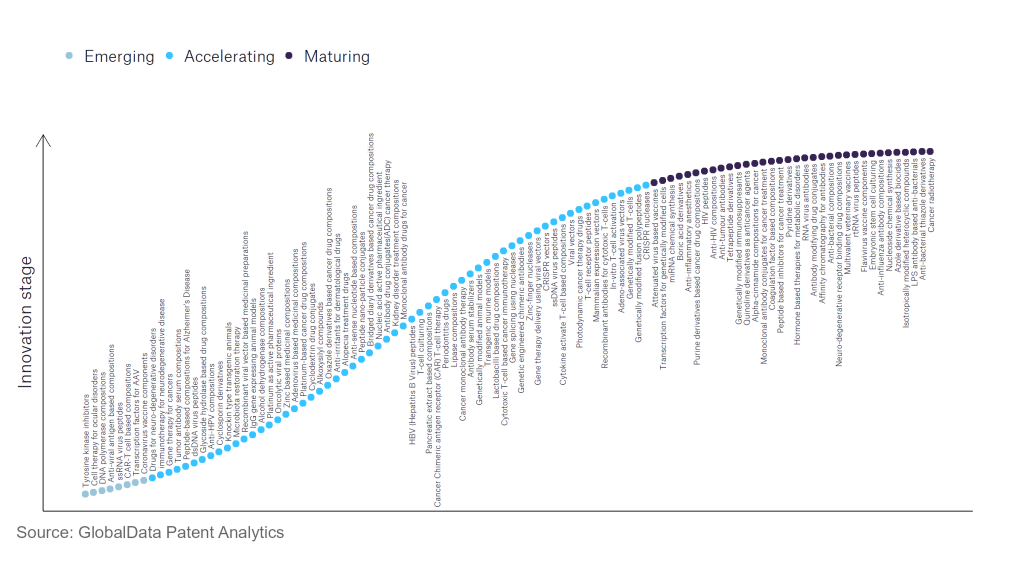The pharmaceutical industry continues to be a hotbed of innovation, with activity driven by the evolution of new treatment paradigms, and the gravity of unmet needs, as well as the growing importance of technologies such as pharmacogenomics, digital therapeutics, and artificial intelligence. In the last three years alone, there have been over 633,000 patents filed and granted in the pharmaceutical industry, according to GlobalData’s report on Innovation in Pharmaceuticals: Antibody modifying drug conjugates. Buy the report here.

Discover B2B Marketing That Performs
Combine business intelligence and editorial excellence to reach engaged professionals across 36 leading media platforms.
However, not all innovations are equal and nor do they follow a constant upward trend. Instead, their evolution takes the form of an S-shaped curve that reflects their typical lifecycle from early emergence to accelerating adoption, before finally stabilising and reaching maturity.
Identifying where a particular innovation is on this journey, especially those that are in the emerging and accelerating stages, is essential for understanding their current level of adoption and the likely future trajectory and impact they will have.
110 innovations will shape the pharmaceutical industry
According to GlobalData’s Technology Foresights, which plots the S-curve for the pharmaceutical industry using innovation intensity models built on over 756,000 patents, there are 110 innovation areas that will shape the future of the industry.
Within the emerging innovation stage, cell therapy for ocular disorders, coronavirus vaccine components, and DNA polymerase compositions are disruptive technologies that are in the early stages of application and should be tracked closely. Adeno-associated virus vectors, alcohol dehydrogenase compositions, and antibody serum stabilisers are some of the accelerating innovation areas, where adoption has been steadily increasing. Among maturing innovation areas are anti-influenza antibody compositions and anti-interleukin-1, which are now well established in the industry.
Innovation S-curve for the pharmaceutical industry

Antibody modifying drug conjugates is a key innovation area in pharmaceuticals
Antibody–drug conjugates (ADCs) comprise of a monoclonal antibody chemically linked to a drug or a radionucleotide to deliver a cytotoxic payload to specific cell types. The monoclonal antibody binds to specific proteins or receptors found on cells, such as cancer. The linked drug enters these cells and kills them without harming other cells. ADCs have gained importance in drug delivery, especially in diseases such as cancer, as these molecules discriminate between healthy and cancerous cells and selectively target the abnormal cancer cells.
GlobalData’s analysis also uncovers the companies at the forefront of each innovation area and assesses the potential reach and impact of their patenting activity across different applications and geographies. According to GlobalData, there are 50+ companies, spanning technology vendors, established pharmaceutical companies, and up-and-coming start-ups engaged in the development and application of antibody modifying drug conjugates.
Key players in antibody modifying drug conjugates – a disruptive innovation in the pharmaceutical industry
‘Application diversity’ measures the number of different applications identified for each relevant patent and broadly splits companies into either ‘niche’ or ‘diversified’ innovators.
‘Geographic reach’ refers to the number of different countries each relevant patent is registered in and reflects the breadth of geographic application intended, ranging from ‘global’ to ‘local’.
F. Hoffmann-La Roche is the leading patent filer for antibody modifying drug conjugates. The company develops drugs and diagnostics to treat major diseases. It provides medicines for the treatment of cancer, other auto-immune diseases, central nervous system disorders, ophthalmological disorders, infectious diseases, and respiratory diseases. The company also offers in vitro diagnostics, tissue-based cancer diagnostics, and diabetes management solutions.
In terms of application diversity, AbbVie is the top company, followed by A. Menarini Industrie Farmaceutiche Riunite and Seven and Eight Biopharmaceuticals. By means of geographic reach, Amgen holds the top position. Takeda Pharmaceutical and Pfizer are in second and third positions, respectively.
To further understand the key themes and technologies disrupting the pharmaceutical industry, access GlobalData’s latest thematic research report on Pharmaceutical.
Data Insights
From

The gold standard of business intelligence.
Blending expert knowledge with cutting-edge technology, GlobalData’s unrivalled proprietary data will enable you to decode what’s happening in your market. You can make better informed decisions and gain a future-proof advantage over your competitors.



